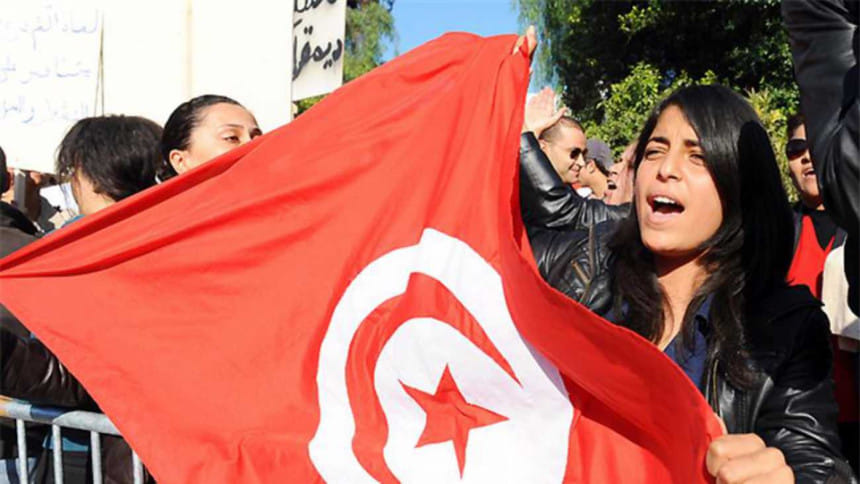Islamists and secularists adjust to work together

It is encouraging to watch how Rachid Ghannouchi and Nahdha, the largest and most popular Islamic political party in Tunisia which is now widely expected to come to power again in the next election, have been transforming over time. Recently Ghannouchi astonished the world by declaring that "We will exit political Islam", meaning that the country would be working to separate religious work from politics. Coming from one who once advocated Sharia law in governance, this change is amazing. Ghannouchi's leadership of remaining flexible, without compromising fundamental values and principles of Islam, has played a major role in helping Tunisia to become a vibrant democracy today, when other countries in the region have failed.
While Nahdha was in power, two opposition leaders were assassinated in 2013 and there were mass protests. To restore trust and confidence among people, Nahdha resigned and handed over power to a neutral caretaker government, who would be in charge until the next election. A secular party, Nidaa Tounes, got the majority in the Parliament in the subsequent election held in October 2014. Nahdha readily conceded defeat and pledged its cooperation. Thus a dignified political tradition, complying with the democratic spirit, was initiated. People's trust was restored. Even the parties who lost in the last two elections in Tunisia confirm that elections were fair and the system is working well.
Going back, in June 2003, representatives of three major secular political parties made a visionary and courageous move in meeting representatives of Nahdha, then in exile, to negotiate and sign a joint declaration: "Call from Tunis" (issued from Paris). That document laid down rules of future political engagements that would ensure upholding democratic principles as well as respecting religious traditions and guaranteeing religious freedom. Since then, constructive engagements and protracted negotiations for a decade or so have produced a progressive Constitution, including terms of gender parity, proportional representation (PR) electoral system, and so on; a political system that should be emulated by the rest of the Muslim world.
This is an enormous achievement for a previously divided society that was ruled by autocrats since its independence from France in 1956, and torn between modernity and religious traditions. Since the Jasmine Revolution that ended President Ben Ali's 23-year autocratic rule in January 2011, the nation has gone through difficulties but has survived with amazing resilience. The main contributing factor is the constructive engagement of the oppositions and the consequent changes in the greater society creating optimism and public trust in the political processes.
Right after the revolution, Nahdha was very popular and was widely expected to win about 90 percent seats in the Constituent Assembly without the PR [proportional representation] system. That would be unacceptable to the secular and liberal parties. To avoid turmoil in the country, Nahdha accepted PR whereby, they knew, the party's share of the Assembly would drastically shrink.
In fact in the October 2011 elections, after using the PR system, Nahdha got only 41 percent seats. In spite of being the largest party in the Assembly, Nahdha formed coalition and shared power with the two secular groups. Paradoxically, the constraints and compromises of power-sharing among the oppositions have been the key to Tunisia's success in having a functional democracy today.
On the other hand, Egypt, a regional power, could not hang on to the emancipation process after ending the long repressive rule of Hosni Mubarak around the same time of Tunisia's Jasmine Revolution in January 2011. Only two-and-a-half years after the Revolution, and one year after Mohamed Morsi from the Muslim Brotherhood (MB) was elected president, a military coup removed Morsi from power on July 3, 2013. Again a military man, the former Defence Minister, Abdel Fateh al-Sisi, who led the last coup, is on the throne, claiming to have received over 90 percent votes in the last election. Egypt is back full circle.
The main reason Egypt was unsuccessful is because secularists and Islamic groups failed to reach out to each other. President Morsi, after assuming power, refused to listen to the secular voices in the country, took an uncompromising approach, tried to consolidate power fast, and sent a signal of another authoritarian rule in Egypt. Massive protests erupted nationwide and turmoil ensued. The army took over power. The nation, since its independence from Britain in 1922, lost a historic opportunity for self-rule. The Islamic party bears a lion's share of the blame for this failure. However, looking back, secular forces also remain responsible for this unfortunate outcome. Moderate Islamists have been persecuted at the hands of autocratic secular rulers going back to Nasser's time over 60 years ago, while secular groups and civil society gave lip service to pluralism but remained silent when moderate Islamists were oppressed and their rights were violated.
Many western and eastern scholars have been repeatedly pointing out that whenever constructive moves of moderate Islamist groups are ignored and they are persecuted, extreme radical forces emerge. Ghannouchi confirms: Salafist and Jehadist groups emerged both in Tunisia and Egypt during the repressive secular rules.
As radicalism intensifies, autocratic regimes find more excuses to continue their grip in the name of fighting terrorism. In reality, they imprison opposition leaders at will and violate the civil rights of citizens. The western powers, in the name of stability, support and do business with these undemocratic ruthless regimes. Their support reinforces the status quo and their hypocrisy creates cynicism and distrust among the people under such a repressive rule. The anger and frustration of some segments of the society, especially of the younger generation, help reinforce radicalism. Radicals find more justifications for their vicious work. That also increases the ferocity of repression.
This vicious cycle continues with the reckless way of pursuing de-radicalisation. The recent events in many countries is a testament to the fact that the 'War on Terror' policy has failed, in spite of spending hundreds of billions of dollars by the powerful western countries. There is no military solution to radicalism, especially in this global society with an ever higher intolerance for subjugation and humiliation, and with the ever more availability of arms through reckless arms businesses. It is long overdue that the world powers focus on a deep rooted agenda to address radicalism, such as helping establish power-sharing democratic rule. The counterproductive strategy of pursuing stability at the expense of democracy ultimately helps create a stagnant situation devoid of both stability and democracy.
Tunisia seems to be getting out of this quagmire. Radicals have either mostly been transformed or marginalised. Both Islamists and secularists are finding common grounds and democracy is thriving in the country.
The writer is Executive Director, US based Justice, Peace and Progress.
E-mail: [email protected]

 For all latest news, follow The Daily Star's Google News channel.
For all latest news, follow The Daily Star's Google News channel. 








Comments